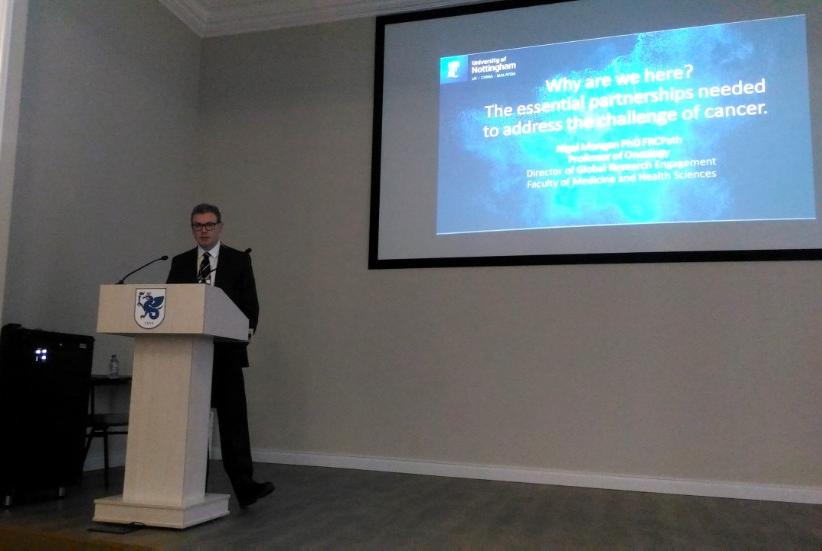The Institute of Fundamental Medicine and Biology of KFU is hosting a two-day international conference 'Kazan Precision Medicine Workshop'.
Leading scientists of the world discuss the implementation of precision cancer therapy in the clinic at KFU

The Institute of Fundamental Medicine and Biology of KFU is hosting a two-day international conference 'Kazan Precision Medicine Workshop', which is attended by researchers from the US, UK and Russia.
Within two days, scientists will discuss issues of personification and precision in the diagnosis and treatment of cancer.
The main participants of the event are researchers from the University of Nottingham in the UK, Cornell University in the USA, the Elseiver company in the USA, the Institute of Fundamental Medicine and Biology of the Kazan Federal University and the Kazan Oncological Dispensary of the Ministry of Health of the Republic of Tatarstan.
“Over the past five years, significant advances have been made in the field of oncology in the field of personification and in the precision of diagnosis and therapy of oncological diseases. The model of precision medicine involves the appointment of treatment taking into account the individual characteristics of each patient, – emphasized in the information sheet of the conference. “In accordance with this approach, the choice of drugs for the treatment of oncological diseases is based on the study of genomic, proteomic, and metabolomic patterns of patients using modern next-generation sequencing technologies, high-resolution mass spectrometry, tumor imaging technologies, and multiparametric bioinformatics analysis.”
The conference participants were welcomed by Vice-Rector for Biomedical Direction, Director of the Institute of Fundamental Medicine and Biology of KFU Andrey Kiyasov and Deputy Head of the StrAU Translational 7P Medicine, Professor of the Department of Genetics, IPM&B KFU Albert Rizvanov.
“At this conference, we are discussing how to improve the treatment of cancer patients. Now a new trend is developing in the world: personalized, precision medicine, when patients are treated not with a universal, but with a personalized approach, that is, they carry out in-depth analyzes, primarily genomic ones. And according to these results, patients are recommended to undergo one or another course of therapy, – said Albert Rizvanov. – During the conference, a representative of Cornell University described a clinical case when a certain mutation was found in a patient, for which there is currently no approved drug, but there are clinical studies in which these mutations are trying to be corrected with experimental drugs. The doctors were able to refer these patients to these clinical trials, where they received an experimental therapy that had a positive effect.The main question is how can we use modern genomic, omics data in order to get the most complete picture about a particular patient and how doctors can decide which existing or experimental drugs could help this patient.”
By the way, the issues of large databases and the problems that arise due to the lack of communication between researchers and doctors were highlighted in his report Elseiver USA Service Director Anton Yuriev, working in the field of personalized medicine, drug development and agrobiology.
“I brought to Kazan a report with suggestions on how to use our database to achieve the goals of personalized medicine – to analyze patients, select drugs based on this analysis, and information on how successfully our scientific programs were applied to the clinic,” he stressed. . – The main problem hindering the development of new methods of treatment in the field of oncology is the lack of communication between doctors and researchers. There are very few white spots left in science in this area. But science is developing very quickly, and doctors, getting an education, then do not have time to master all the volume of new emerging information. There are large databases that remain unused in patient analysis. For all these reasons, the key now is to put all this big data into clinical practice.”
The conference will run until September 12th. During this time, it is expected to hear reports on the following topics: "International Cancer Research Consortia: Why are we here?" bubble”, “Precision medicine and bioinformatics”, “Precision medicine and oncologist”, “Practice of surgical oncologists in Russia: advantages and problems”, “Oncological genomic research in the Republic of Tatarstan” and other reports.
